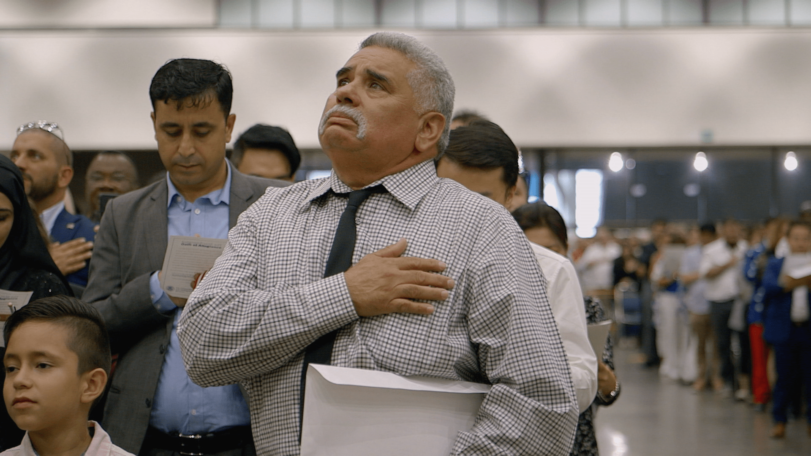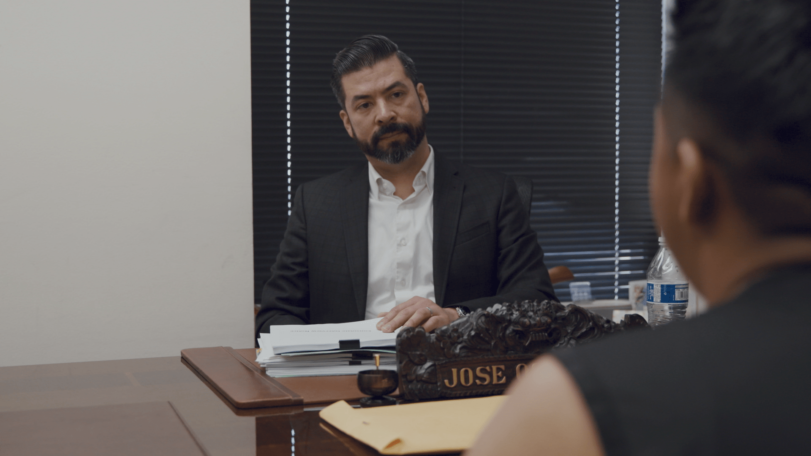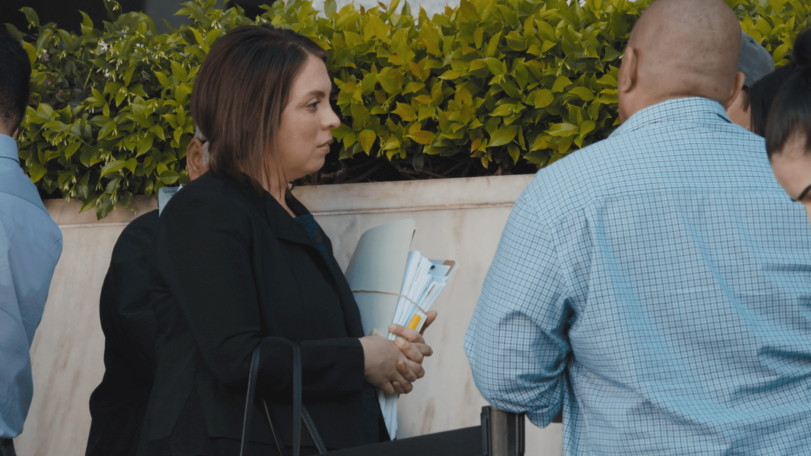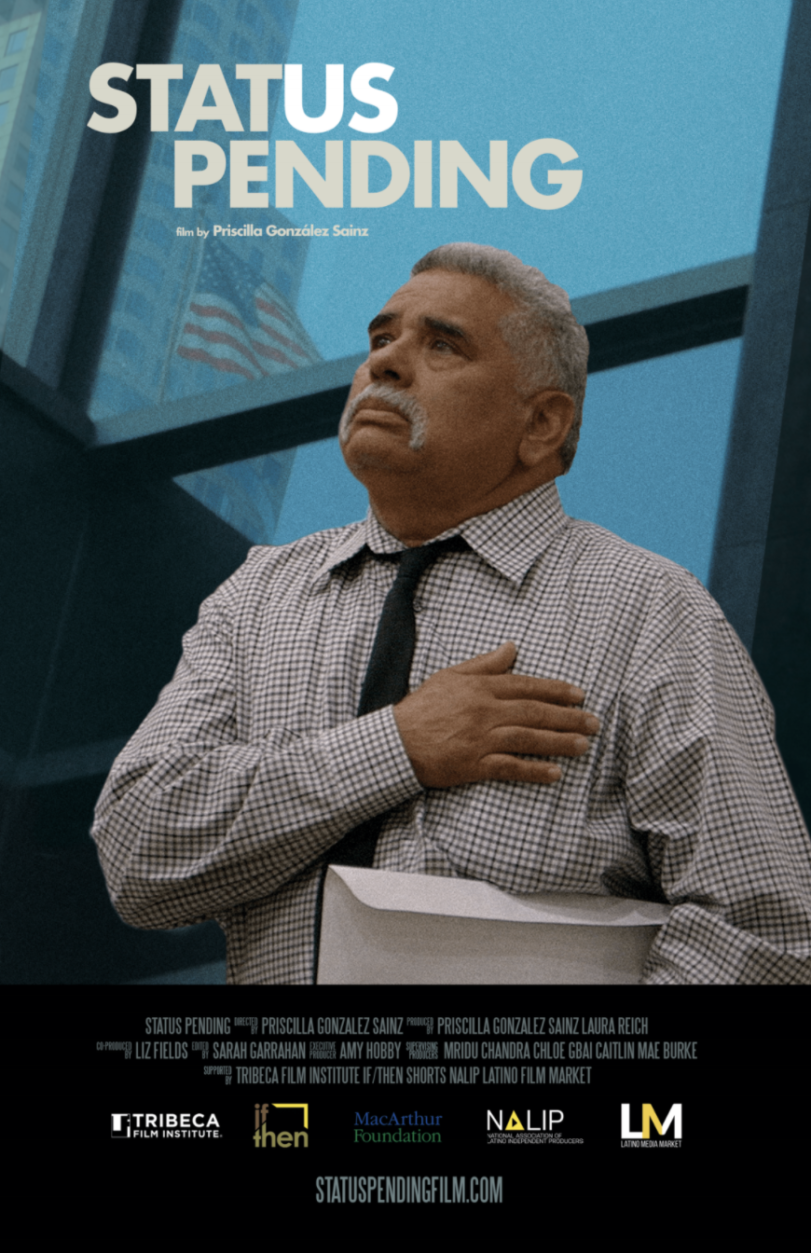
Priscilla González Sainz is a first generation Mexican American filmmaker born and raised in California. From Sundance to the Sony Lot and Stanford, Priscilla is a director who is passionate about nonfiction media and immigration issues.
Her documentary short film Status Pending won the IF/Then Shorts American West Pitch competition at the 2019 Big Sky Documentary Film Festival and has since been screening at film festivals across the country.
Status Pending follows a team of of first generation Mexican American immigration lawyers who rely on each other for support against the difficulties of their job. Recently, Status Pending won the Audience Pick Award at the 2020 Palm Springs International Short Fest.

Synopsis “Contending with the constant attack on immigrants and Immigration Law, the lawyers on the frontlines are feeling burned out and disillusioned. This film takes us into the lives and work of five members of an informal support group comprised of Mexican-American, solo-practitioners who got their start at the same high-intensity law firm in Los Angeles. Through their friendship and constant communication, Araceli, Alma, Gladdys, Elizabeth and Jose provide professional and emotional support for each other as they navigate the constant attacks on their clients and profession. Through their perspectives, we see how changes in the interpretation of the laws and in legal procedures directly affect the people they so passionately advocate for by endangering their safety and prolonging family separation. After several years in the trenches, even the most dedicated come to question whether they can continue in this often-heartbreaking line of work. “
(source: https://www.statuspendingfilm.com/)
*This interview has been edited for length and clarity
Q: How did you decide what story you wanted to tell and what aspects of that story were most important?
PGS: I felt that with this film I really wanted to tell the story of what (immigration) is like as a legal process. In order to make that interesting, I needed to connect to characters, which are the lawyers and some of the clients. I wanted to add a film that would add to this larger narrative we are having in cinema about the experiences that represent that legal process. My way in was through my sister, who is an immigration lawyer (featured in the film). After grad school, I worked for her while she was starting up her firm. I saw what it was like for her to do that work and I really felt there was another side to the story that needed to be told. What really made a difference was learning she was part of this little lawyer support group that meant so much for her. So I felt, how can I show this, but focus on how our community helps each other? It meant a lot to me that all the members of the group were first generation immigrants and lawyers. They all feel very passionate about what they do and so in many ways it was meant to be a film about their support and friendship through the difficulties they faced. But with the full awareness that they deal with the people that are most vulnerable at points, and how they carry and how they deal that.

Q: When you’re talking with the clients themselves, how did you gain access and develop trust? Was it through your sister? How do you navigate having these people trust you with their stories?
PGS: In terms of navigating trust, in particular with clients who shared their stories, it was always through their lawyers. I think that is really important. The other films that I have created dealt with people in really vulnerable situations and I think it’s best for an intermediary person to help with that process as opposed to just approaching someone and saying, “Hey I want to interview you!” It’s really a collaborative process in that way. I would work with the lawyers and check in very often through phone calls and emails, and asking which clients we would be able to speak with and see if anyone would be willing to film their meeting with them. Once they agreed, in terms of setting up that relationship, it has to be something that has to happen on the spot because you could only get people that one time. With the lawyers, one of them was my sister, and some I have known longer so we have time to establish that relationship. I did speak with outside lawyers to make sure nothing would be harmful or put anyone in danger. By having that in place it was helpful for both clients and lawyers to feel comfortable with me there for however long I was going to be there.
Q: How do you structure your film when you’re dealing with a subject like this, where the process can be very slow and can take years, while maintaining a short film format? What kind of challenges arose?
PSG: Structuring the film was very complicated for me because it’s a short film about five people plus clients. I knew that there was more that I wanted to include in the film, even with relationships between the lawyers, but we needed to figure out how to structure the film in a way that presented this portrait of a group and what it’s like to experience this specific process. So originally, the thought was more of a day in the life — just one day. But then that proved to not make sense narratively because yeah, some of these cases take time! Structuring it, I went more with a vignette style where you sort of get different glances in with different people and its creating more of a thematic narrative of giving a sense of what its like, without the narrative hinging on a specific case because that would’ve only worked with a longer film. This was about creating a portrait of what happens. Structuring it took a lot of time, a lot scenes moved around and working with amazing editors really helped with figuring out how to structure this portrait. The only character that is a client that reoccurs, is the first character, Rudy, so he has a little bit of a structure as well because he finishes his process and it provides a little bit of hope at the end as well.
Q: How long did you film for?
PGS: I filmed from March – August 2019, with principal production on and off because it was completely dependent on when the lawyers were available.

Q: The film prominently features text message conversations between the five lawyers. Where did the idea to include that come from? Was it always there or did it come in the editing process?
PGS: The text messages were always important to me, since I (first) learned about the group. They were providing a constant source of information or jokes and support to each other. I saw very really early on that that was the glue that tied them together regularly because they cant see each other that often. I always knew it would be important, so early on I let them know I was interested in this and wanted what they would be willing to share. So they shared screenshots.

On the Use of Sound:
PGS: There is a very subtle score, it comes up because I tend to use very little and very subtle music. I worked with the composer Jorge Corrante, who was wonderful because we were able to collaborate and make something that fit the tone I was going for which was to try and emphasize the more observational approach when its not as possible in a short film with so many people. In order to try and ground it in reality as much as possible, I didn’t want to add to much music or have it be too distracting. A lot of time, we hear the music with the passage of time or just someone just in their headspace, so it’s very subtle, but not until the end we hear the loud National Anthem. I didn’t originally think it was gonna end that way but it just felt right, once that happened.
Q: Covid has changed everything, what’s it like being a creator and doing these online/virtual events?
PGS: Surreal — I mean its definitely a different experience, especially participating in online film festivals. But first of all, I think it’s so amazing that film festivals stepped up and finding ways to figure out what they can do. Some have cancelled but a lot of them have figured away and fortunately I have participated in a few. It’s cool to see how they are learning from each other. I just think it’s amazing that they are doing that (online screenings) because ultimately we want our films to be seen. On the positive side, your audience is no longer the filmmaker audience, your audience is the world essentially. That is incredible because not everyone has access to film festivals but more people have access to the internet and that is incredible for the art form. It also has allowed for filmmakers from all over the world to participate in panels and there’s definitely access to participating in conversations no matter where you are. I think the thing thats missed is just that personal interaction with showing your film and someone coming up to you and talking about the film, or getting to know the filmmakers, having more opportunities to meet with industry folks too more organically as opposed to the camera so definitely that interpersonal side, I miss the connections.
Fortunately I was able to premiere the film in a live screening in February of this year at the Big Sky Documentary Film Festival , so I am fortunate and so grateful to have the opportunity to screen the film there and that was the festival where I won the pitch the year before. My whole team was there , so it was such a great celebration of all the work everyone put in. I really feel for my colleagues who were not able to that because their premiere was after the pandemic had started. We’re all just embracing different strategies.
Q: What’s next?
PGS: I’m collaborating with a couple of filmmakers with some projects. We’re writing a short film about immigration through the lens of children and I’m also collaborating with Kristal Sotomayor who is another great filmmaker out in Philidelphia on her documentary. From that, I’ve been working on my film, continuing on working with Tribeca Film Instititue. We really want to emphasize impact as we get closer to the election. My goal for the film has always been to use the film as a way to create dialogue and share immigration resources for people going through the process, as well as a lot of support for immigration professionals and what they go through. Our biggest push is to support voter registration, new voters, and do what we can to empower those voices. I mean it’s a film, but I really hope it starts conversations and empowers others to help people on the ground.
Find Priscilla online at: https://www.priscillagonzalezsainz.com/
About Priscilla: Priscilla González Sainz is a Mexican-American filmmaker based in Los Angeles and Guadalajara. Her work focuses on first-generation and women’s stories and centers on themes of displacement and identity. Priscilla recently earned her MFA in Documentary Film and Video from Stanford University where she was awarded a Stanford Arts grant and curated the Latin American Cinema series ‘Espejos.’ Her thesis film ROOM 140 was a Student Academy Award Semifinalist and was nominated for the IDA Wolper Student Documentary Award. Her films have screened at AFI Docs, Full Frame, Big Sky, Palm Springs ShortFest, Los Angeles Film Festival, New Orleans Film Festival and more.
Most recently, Priscilla won the Tribeca IF/Then Shorts Pitch for the American West at Big Sky Documentary Film Festival with “Untitled Immigration Lawyer Documentary,” her current project in production. (source: https://www.priscillagonzalezsainz.com/about)
